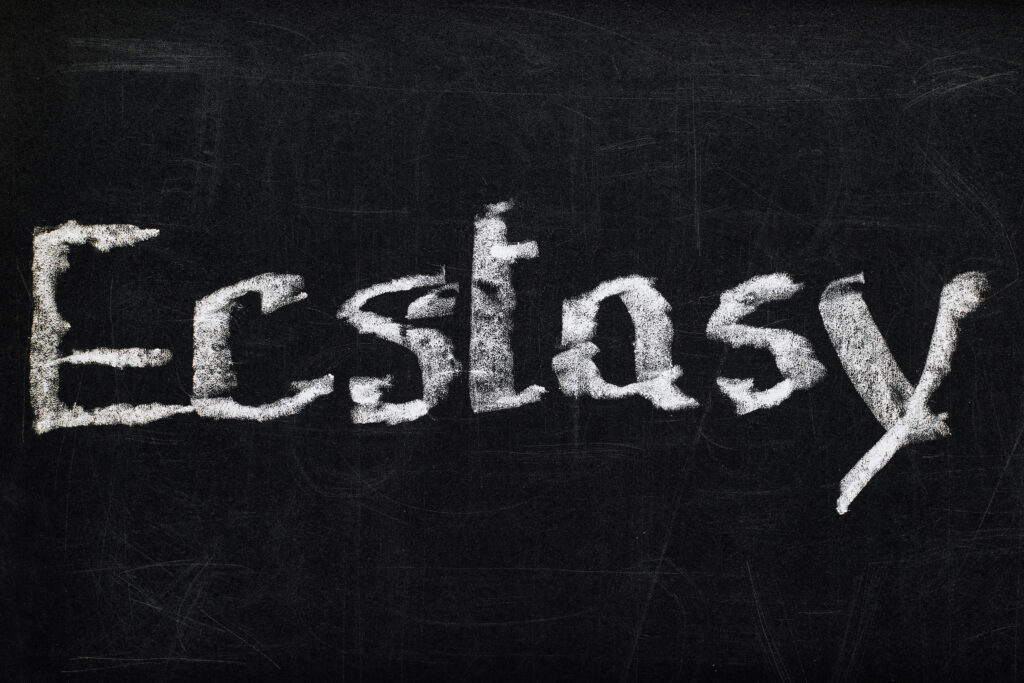Ecstasy is the street name for 3,4-methylenedioxy-methamphetamine, a hallucinogenic stimulant drug popular in social settings like parties and nightclubs. It is also known as Molly and causes users to experience increased energy levels, time distortion, and heightened perception and enjoyment of sensory experiences. Ecstasy was previously used for treating mental disorders like anxiety and post-traumatic stress disorder (PTSD) but was discontinued due to issues surrounding its use.
Ecstasy comes as a pill or white crystalline powder, producing a euphoria that lasts between three to six hours. It is difficult to obtain pure ecstasy on the street as it is mostly manufactured in illegal laboratories where it may be mixed with other chemicals. This drug is common among college students, especially at raves and parties. 92% of people who use ecstasy go on to abuse other drugs like cocaine, heroin, and marijuana.
All ecstasy use in Canada is considered illegal except with special permission for medical, industrial, or scientific purposes. Chronic ecstasy abuse can lead to dependence and addiction, albeit to a lesser degree than drugs like opioids or methamphetamine. However, ecstasy users may encounter severe addiction issues similar to these substances. The Canadian Centre for Addictions offers ecstasy addiction treatment and rehab in Ontario.

Getting Help for Ecstasy Addiction
If you or a loved one is dealing with ecstasy dependence or addiction, the Canadian Centre for Addictions can help. At CCFA, we offer sophisticated ecstasy addiction help in an environment that inspires lasting change. We also help people understand their addictions and the healthier coping strategies available by engaging them in one-on-one counselling with certified counsellors, psychiatrists, and mental health professionals. Call 1-855-499-9446 to learn more about our ecstasy treatment program.
How We Treat Ecstasy Addiction and What to Expect
The best treatment for any substance abuse or addiction is one designed to meet the individual’s specific needs. At CCFA, we tailor our treatment strategies to meet the unique symptoms of the client. Our visitors can expect a full range of services that provide flexible therapy and counselling for addiction. We also know that addiction can negatively impact every aspect of your life, so our specialists will assess you to provide an individualized, client-centred approach to treatment.
Our treatment facility offers inpatient rehab, outpatient treatment, individual and group counselling, intervention counselling, and lifetime aftercare, all designed to give you the best chance at recovery.
When to Seek Help for Ecstasy Addiction

Ecstasy use is common in party scenes and is widely considered a problem, especially among young people but also older adults. There is a commonly held notion that the use of party drugs like ecstasy is harmless, but this is not true, and you need to seek help if you notice the following signs of ecstasy abuse and addiction:
- Try unsuccessfully to stop or cut down on ecstasy use
- Using more of the drug and for longer than initially intended
- Spending a significant amount of time obtaining, using, and recovering from the effects of ecstasy
- Frequently experiencing intense cravings for ecstasy
- Neglecting personal responsibilities to use the drug
- Giving up events or interests for ecstasy use
- Continued ecstasy use despite obvious harmful effects on work, academics, or relationships
- Developing tolerance to ecstasy – needing increased amounts of the drug to get the same effects
- Having functional impairment or significant distress due to ecstasy use
- Having an ecstasy “crash” or “comedown” after stopping ecstasy use
Why Should You Choose the Canadian Centre for Addictions?

Addiction is a disease, and the best way to address it is to seek professional help. It also carries a significant stigma, which makes it difficult for people to speak about what they’re going through or seek support. Addiction disrupts your life and disconnects you from the things that matter. At CCFA, we offer a patient-centric approach that keeps you connected to your life and responsibilities outside so your transition to regular life is as smooth as possible.
We take our work seriously because we understand that our clients are at a vulnerable point in their lives. Our staff are open, honest, and communicative about what we deliver and take the first step towards building the trust needed to form strong bonds with those who need our help.
We also understand that addiction affects not only the individual but others close to them. So, our therapists and staff extend their care to helping families cope with addiction while treating their loved ones. We not only help people overcome their addictions, but we also help them navigate the hurdles that addiction creates for those who care about them.
Treatment at CCFA doesn’t end but evolves when you leave. We offer a place where people can return to if things get hard. Our combination of quality inpatient care and the sense of community from our aftercare services provide a balance you can rely on year after year.
The Canadian Centre for Addictions Success Stories
At CCFA, we have recorded tremendous success in treating people with various addictions. Here are testimonials from some of our satisfied clients:
“The highly competent staff is able to provide emotional and physical support as well as effective addiction therapy. With an open mind, I found I was able to draw healing from each of the well-balanced and skillfully presented meetings and activities. During my stay at CCFA, I learned how to regain control of my life. I left with skills I require to keep moving forward in my recovery. The facility is spacious, comfortable and clean, and the community is exceptional. The fitness and activities, as well as the delicious meals, are outstanding. By far, this was the most productive 30 days of my life. A gift from me to me!”
Elliot Hester
“I came in with a broken soul, full of self-pity, not liking who I was, full of fear and low self-esteem. During my stay, I learned so many valuable lifelong lessons. The counsellors challenged me to feel again; to think and understand those feelings, to express my feelings and thoughts. They have taught me the strategies and tools that I must apply to my new life going forward. For the first time in my life, I feel calm, relaxed, strong with the new me, and most importantly, HAPPY. Thank You.”
Edmund Rudd
“My involvement with CCFA has been an absolute lifesaver for me. The entire program and one-on-one sessions have given me the look and strategies to leave with and have a clean and sober life going forward. A very warm, welcoming, home-like environment.”
Martha Esquivel
“The CCFA has showed me a new way of life. The counsellors here are amazing, love working with all of them. I had a great stay and can’t wait to continue my road to recovery with the tools I have learned. Thank you.”
Kiaan Ochoa
Types of Treatment for Ecstasy Addiction
At CCFA, our treatment programs for ecstasy addiction are designed to address specific client needs and include:
Detox
Medically-assisted detox is the first step in ecstasy addiction treatment. It involves getting all traces of ecstasy and other toxic substances out of the body under medical supervision. Since ecstasy is often abused with other drugs, treatment may involve addressing the effect of each substance used. The withdrawal symptoms of ecstasy are more physiological than physical, and our staff will be on hand to monitor the patient’s response to the process. Medications may be administered for symptoms of depression or anxiety that may arise during detox. Ecstasy detox lasts for two to four days, depending on the severity of the addiction and the presence of other substances.
Inpatient Rehab
Some cases of ecstasy addiction may be severe enough to require treatment at an ecstasy rehab centre. Inpatient rehab is an intensive treatment for severe cases of addiction. CCFA provides a sober and secure environment for clients to recover from their addiction without distractions. Our facilities utilize patient-oriented protocols to set our clients on the path to recovery. People who become addicted to ecstasy often use the drug to cope with pain or sadness. We employ a holistic approach toward treating underlying issues by combining medical treatment with other relevant treatment options.
Outpatient Treatment
Individuals with manageable symptoms may opt for outpatient treatment for ecstasy addiction. In this case, the individual lives at home but attends scheduled appointments and meetings. This treatment type is ideal for clients with manageable symptoms and sufficient motivation to get better. Individuals with kids and other responsibilities may also prefer outpatient treatment. It often requires a reliable support network of friends and family to encourage and help the patient stay on the path to full recovery.
Counselling
Addiction is often caused by negative thinking patterns that fuel harmful behaviour. Finding and modifying the root cause of these thought patterns is often crucial to overcoming addiction. Our addiction counselling programs involve individual or group sessions that help participants identify and change these thought patterns and behaviours. It also helps spot and resolve past trauma that may be promoting addictive behaviour. CCFA’s counselling and intervention programs help addicts develop positive attitudes and skills, which they’ll use as they begin their journey to sobriety.
Aftercare
Addiction recovery does not end with treatment. Recovering addicts require continuous aftercare services to prevent relapse when they face challenges. Our relapse prevention programs equip patients with the tools and coping mechanisms to remain sober when they inevitably encounter triggers. An aftercare treatment plan depends on an individual’s situation and may include outpatient treatment, counselling, and 12-step programs.
What to Expect in Ecstasy Addiction Treatment
When you come to CCFA for ecstasy addiction help, you can expect treatment in an environment that inspires lasting change. The first thing we’ll do when you come in for treatment is to evaluate and understand your situation so that we can design a specialized recovery plan. We’ll also screen you for the presence of other substances and co-occurring mental health disorders.
We will start your treatment with detox to rid your body of all toxic substances. If your situation is severe, you will be admitted to our facility so our staff can safely monitor and manage your symptoms. Otherwise, you’ll be allowed to go home and return for scheduled appointments.
We offer individual and group counselling sessions to help clients identify and change thought patterns that may fuel substance use and addiction. Our holistic treatment programs incorporate activities like meditation, mindfulness, and yoga to help our clients stay grounded. You may also be encouraged to join a support group where you connect and interact with others at different stages of recovery.
Your treatment does not end when you leave our centre. At CCFA, we provide aftercare and relapse prevention services as part of our treatment program. We teach our clients to identify their triggers and design strategies to avoid or get through them. We also offer bi-weekly in-person aftercare visits and teleconferencing options to ensure long-term recovery.
Ecstasy Addiction Treatment Stages
The stages in the ecstasy addiction treatment are:
- Detox
- Inpatient/Outpatient treatment
- Counselling/therapy
- Aftercare
Understanding Ecstasy Addiction

Ecstasy addiction, also known as ecstasy use disorder, is a condition where an individual cannot stop abusing ecstasy despite obvious adverse consequences. It usually starts with the illicit use of the drug in social settings. The effects of ecstasy occur due to its ability to block the reuptake of neurotransmitters – dopamine, serotonin, and noradrenaline – in the brain that regulate pleasure and happiness.
A dose of ecstasy floods the brain with these chemicals, leading to its associated euphoric effects. These feelings wear off when the dose has run its course, and the brain attempts to overcompensate for this surge by producing less than the usual quantity of these compounds. This reduction in neurotransmitter production causes the “crash” that leads to the opposite effects when ecstasy use is withdrawn. If the user continues using ecstasy in this way, they’ll build tolerance, causing them to need higher amounts of the drug to get the same effects. Continued ecstasy use can eventually lead to physiological dependence and addiction.
Withdrawal Symptoms of Ecstasy
The withdrawal symptoms of ecstasy remain a subject of debate among clinical researchers. In most cases, ecstasy is often abused with other drugs and often forms a part of a multi-drug cause of addiction. Some experts state that chronic ecstasy use may cause physical dependence and, therefore, withdrawal. Others suggest that the drug causes no withdrawal symptoms even though there may be tolerance buildup.
Ecstasy withdrawal symptoms are mostly psychological, and they include:
- Anxiety
- Depression
- Memory issues
- Confusion
- Distortion of self-perception
- Apathy
- Malaise
- Apathy
- Loss of appetite
- Insomnia
- Difficulty concentrating
- Suicidal tendencies
Ecstasy Addiction Symptoms
Ecstasy addiction signs and symptoms could be physical, behavioural, or cognitive:
Physical Symptoms
- Increased desire for sexual activity
- Dilated pupils
- Elevated body temperature
- Elevated blood pressure
- Chills
- Weight loss
- Seizures
- Increased heart rate
- Nausea
- Dehydration
- Blurred vision
- Muscle tension and teeth clenching
Behavioural Symptoms
- Hyperactivity due to increased energy
- Irregular sleeping patterns
- Unsafe sexual behaviour
- Improved confidence and sense of self-worth
- Loss of inhibition
- Increased sensitivity to touch, light, and sound
Cognitive Symptoms
- Euphoric sensations
- Heightened sense of mental clarity
- Vertigo and disorientation
- Memory issues
- Anxiety and confusion
What are the Causes of Ecstasy Addiction?
Ecstasy abuse and addiction are usually the result of multiple factors, including:
Genes
An individual with a parent or relative who has had trouble with addiction is more likely to abuse and become addicted to ecstasy and other hallucinogens. Studies on twins raised separately show a positive correlation between genetics and addiction.
Peer Pressure
Many people try ecstasy for the first time at parties, raves, or nightclubs. Individuals, especially between ages 18 to 26, are more likely to be influenced by peers to try ecstasy and other drugs, putting them at risk of addiction.
Prior History of Substance Abuse
People who abuse alcohol and marijuana may be more open to experimenting with substances like ecstasy.
Mental Health Issues/ Emotional Trauma
Mental health conditions like PTSD, depression, and anxiety may cause a person to use ecstasy. Individuals experiencing emotional trauma may try to numb their pain and sadness with substances like ecstasy.
Long-term Effects of Ecstasy Addiction
The long-term effects of ecstasy addiction include:
- Liver and kidney failure from dehydration
- Dramatic rise in heart rate, causing severe complications for individuals with cardiovascular disease
- Impaired memory and psychosis from heavy use
- Brain damage, especially to the areas that regulate emotions, learning, and sleep
- Overdose, especially when mixed with other drugs, which can lead to death from hyperthermia.
Frequently Asked Question
Ecstasy is a controlled substance not approved for use in treating any ailment. However, the drug is potentially beneficial for treating conditions like PTSD, anxiety, depression, and alcohol addiction.
Ecstasy produces the effects that characterize addiction – tolerance, psychological dependence, and withdrawal symptoms – depending on the frequency and duration of use. Experts disagree on the addictive potential of ecstasy (Molly), but chronic use of the drug leads to issues associated with other types of addiction.
Ecstasy is detectable in the body for two days to three months after the last use, depending on the dose and type of test performed. It can be detected in the saliva, blood, and urine up to three days after ingestion and in scalp hair for up to three months.
Yes. Research shows that ecstasy affects men and women differently. Women are more sensitive to ecstasy when they use the same amounts as men and experience more intense effects. They may also experience more severe long-term effects like paranoia, anxiety, and depression because of its serotonin-releasing effects on estrogen levels.
Using ecstasy when pregnant or breastfeeding endangers the mother and baby. An expectant mother taking ecstasy is at higher risk of experiencing depression, hallucinations, seizures, elevated body temperature, high blood pressure, and abnormally fast heart rate, which can affect her ability to care for her child. High amounts of ecstasy also pass into breast milk, putting the baby at risk of developmental problems.
Yes. Ecstasy is the street name for 3,4-methylenedioxy-methamphetamine (MDMA). Ecstasy is typically used to describe MDMA powder pressed into pill form, while Molly is the powder or crystal form of the drug that is snorted, injected, or placed in a capsule for ingestion.
Ecstasy increases the brain’s serotonin levels to produce its associated euphoric effects. However, too much serotonin in the brain can cause serotonin syndrome – a harmful and potentially fatal condition that causes autonomic hyperactivity, neuromuscular abnormalities, and altered mental status.
You know you are addicted to ecstasy if you cannot stop taking the drug despite your best efforts and its adverse side effects. It’s crucial to seek professional help if you’re struggling with ecstasy addiction.
- Very high blood pressure
- Hyperthermia
- Seizures
- Panic attacks
- Loss of consciousness
- Fainting spells
The risk of ecstasy overdose is increased when combined with alcohol or other drugs – a common practice among users.
Give Us a Call and Let Us Guide You
Call CCFA today at 1-855-499-9446 if you or a loved one is battling with drug addiction. Our Toronto rehab institutes in Ontario, Canada offer treatment, counselling, and support for people dealing with addiction.
.

